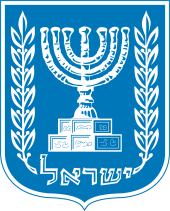Portal:Israel
Lua error in Module:Effective_protection_level at line 63: attempt to index field 'TitleBlacklist' (a nil value).
Portal maintenance status: (July 2018)
|
    Israel, officially the State of Israel, is a country in the Southern Levant region of West Asia. It is bordered by Lebanon and Syria to the north, the West Bank and Jordan to the east, the Gaza Strip and Egypt to the southwest, and the Mediterranean Sea to the west. The country also has a small coastline on the Red Sea at its southernmost point, and part of the Dead Sea lies along its eastern border. Israel's proclaimed capital is in Jerusalem, while Tel Aviv is the country's largest urban area and economic center. Israel is located in a region known to Jews as the Land of Israel, synonymous with the Palestine region, the Holy Land, and Canaan. In antiquity, it was home to the Canaanite civilization followed by the kingdoms of Israel and Judah. Situated at a continental crossroad, the region experienced demographic changes under the rule of various empires from the Romans to the Ottomans. European antisemitism in the late 19th century galvanized Zionism, which sought a Jewish homeland in Palestine and gained British support. After World War I, Britain occupied the region and established Mandatory Palestine in 1920. Increased Jewish immigration in the leadup to the Holocaust and British colonial policy led to intercommunal conflict between Jews and Arabs, which escalated into a civil war in 1947 after the UN proposed partitioning the land between them. (Full article...) Template:/box-header
The culture of Israel is closely associated with Jewish culture and rooted in the Jewish history of the diaspora and Zionist movement. It has also been influenced by Arab culture and the history and traditions of the Arab Israeli population and other ethnic minorities that live in Israel, among them Druze, Circassians, Armenians and others. Tel Aviv and Jerusalem are considered the main cultural hubs of Israel. The New York Times has described Tel Aviv as the "capital of Mediterranean cool," Lonely Planet ranked it as a top ten city for nightlife, and National Geographic named it one of the top ten beach cities. Similarly, Jerusalem has earned international acclaim; Time magazine included it in its list of the "World’s Greatest Places," and Travel+Leisure ranked it as the third favorite city in ME and Africa among its readers. (Full article...) This is a Featured picture that the Wikimedia Commons community has chosen as one of the highest quality on the site.
The page "Portal:Israel/box-header" does not exist. The page "Portal:Israel/Did you know/5" does not exist. Template:/box-header Template:/Related Portals Template:/box-header Template:/Projects Template:/box-header
This is a Good article, an article that meets a core set of high editorial standards.
Haifa (/ˈhaɪfə/ HY-fə; Hebrew: חֵיפָה, romanized: Ḥēyfā, IPA: [ˈχajfa]; Arabic: حَيْفَا, romanized: Ḥayfā) is the third-largest city in Israel—after Jerusalem and Tel Aviv—with a population of 290,306 in 2022. The city of Haifa forms part of the Haifa metropolitan area, the third-most populous metropolitan area in Israel. It is home to the Baháʼí Faith's Baháʼí World Centre, and is a UNESCO World Heritage Site and a destination for Baháʼí pilgrimage. Built on the slopes of Mount Carmel, the settlement has a history spanning more than 3,000 years. The earliest known settlement in the vicinity was Tell Abu Hawam, a small port city established in the Late Bronze Age (14th century BCE). In the 3rd century CE, Haifa was known as a dye-making center. Over the millennia, the Haifa area has changed hands: being conquered and ruled by the Canaanites, Israelites, Phoenicians, Assyrians, Babylonians, Persians, Hasmoneans, Romans, Byzantines, Arabs, Crusaders, Ottomans, and the British. During the Battle of Haifa in the 1948 Palestine war, most of the city's Arab population fled or were expelled. That year, the city became part of the then-newly-established state of Israel. (Full article...) Jachnun or Jahnun (Hebrew: גַ'חְנוּן, Hebrew pronunciation: ['d͡ʒaχnun], ['d͡ʒaħnun]) is a Yemenite Jewish pastry, originating from the Adeni Jews, and traditionally served on Shabbat morning, with resek agvaniyot, hard-boiled eggs, and zhug. Jachnun has become popular in Israeli cuisine, where it is served in homes (usually on Shabbat), as fast food at roadside stalls, and in restaurants, events, and dining halls. (Full article...)
The following are images from various Israel-related articles on Wikipedia.
Template:/box-header Template:/News Template:/box-header Template:/Featured content Template:/box-header {{Wikipedia:WikiProject Israel/to do2}} The following Wikimedia Foundation sister projects provide more on this subject:
Template:/box-header Template:/In the news Discover Wikipedia using portals |






















